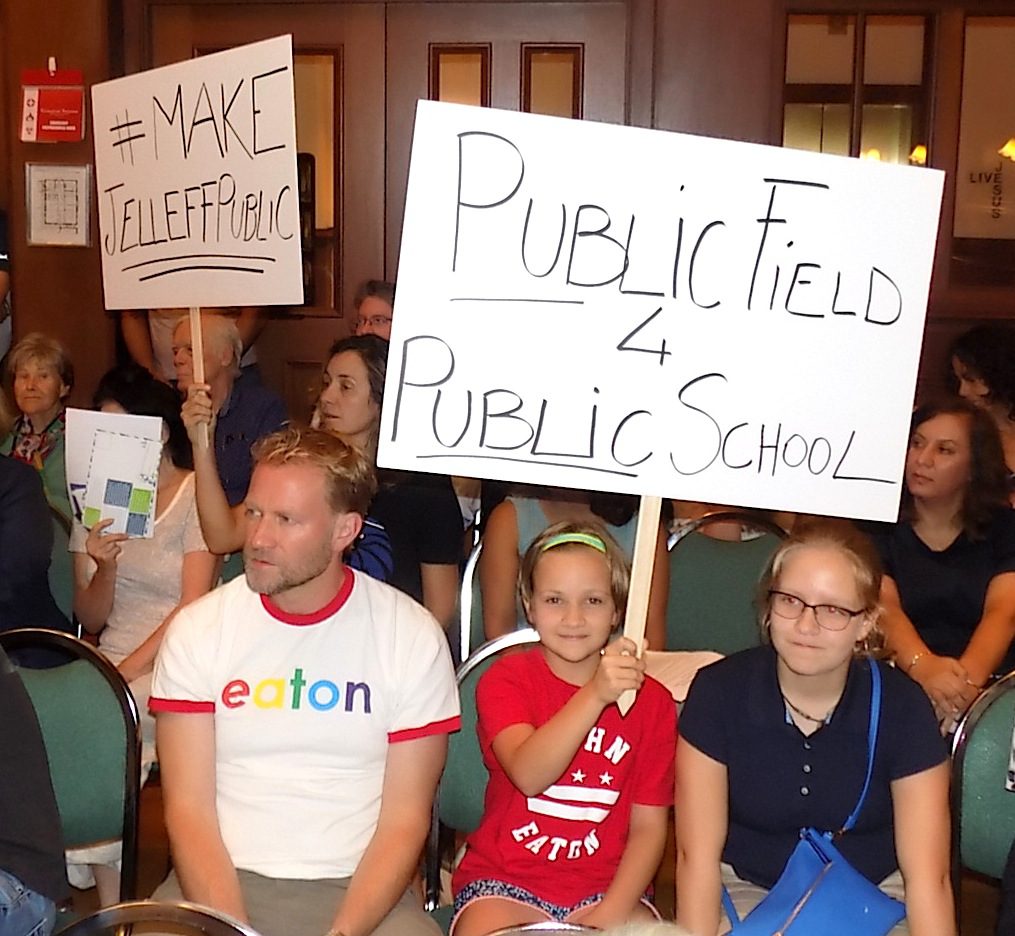ANC Meeting Erupts in Protest Over Jelleff Agreement
By • September 5, 2019 0 1343

Signs reading “Make Jelleff Public,” passionate statements and a resolution created by elected officials on laptops in front of a packed crowd dominated the first fall meeting of Advisory Neighborhood Commission 2E on Tuesday, Sept. 3. All this activity was triggered by anger over the just-signed, nine-year extension of a 10-year agreement between the District Department of Parks and Recreation and Maret School, little changed from the 2009 original.
Maret — a private, co-ed K-12 school at 3000 Cathedral Ave. NW with a student body of about 650 — will continue to finance repairs and maintenance of the playing field and fences surrounding the Jelleff Recreation Center, located at 3265 S St. NW, at an estimated cost of $750,000. In addition, Maret will contribute $250,000 to modernize the center, adding to the $7 million already dedicated to the project by the city.
In exchange, Maret will retain exclusive use of the Jelleff playing field on school weekdays between 3:30 and 5:30 p.m. in the fall and spring. A separate agreement made last year with Hardy Middle School to use the field every Wednesday between 4 and 5:30 p.m. during the fall and spring semesters was also recently announced.
But these arrangements have become increasingly contentious.
Since January, parents of Georgetown public school students — especially those at Hardy Middle School, across Wisconsin Avenue from the Jelleff field — and community leaders have demanded that the contract process be transparent and also consider a deal for expanded use by community and school sports teams and players across the District. That didn’t happen, according to Elizabeth Miller, advisory neighborhood commssioner for the Jelleff area.
“From the documents provided, it appears the only consideration made by DPR is the cozy continuation of a contract with one small private school, made nearly a decade ago, with no public process. It is disappointing that there appears to be no concern for the needs of public school students (even the Hardy School ACROSS THE STREET from the field), no concern for greater access for diverse youth groups who lack facilities, or any other stakeholders. Quite frankly, from the documents I read, I do not even see an attempt by DPR to negotiate a more favorable deal for DC taxpayers with the current contract. What am I missing?” she wrote to DPR in July.
“In May, a town meeting of over 100 participants was held at the R Street library. All sides were heard,” Maret Head of School Marjo Talbott told The Georgetowner on Aug. 30. “We have more than fulfilled all the conditions for the extended contract and have been very open about what we propose to do in the next decade. We feel we have been very transparent and also open to all those who want to use the field. But the fact is that it is a limited resource and not everyone can use it who wants to under any schedule.”
Many point out that there wouldn’t be a sports facility at all if Maret School hadn’t stepped in to fully fund its total reconstruction in 2009 at a cost of over $2 million. In fact, there was serious talk about selling the property entirely in 2008, according to newspaper articles at the time. “Maret entirely rebuilt the playing field and fences but also refurbished the pool and installed night lights which Maret never uses,” Talbott pointed out. “In addition, every summer Maret sponsors expansive sports programs at Jelleff open to anyone in the District.”
“The DPR is proud to move forward investments that minimize costs to D.C. taxpayers,” Acting Director Delano Hunter wrote in a recent statement, noting that, over 20 years, Maret School will have committed a total of more than $3 million to the development and maintenance of the Jelleff sports complex. According to Hunter, the city did not have sufficient funds to cover these costs.
But there is an image program. In a January memo, D.C.’s Partnerships & Development Officer Rose Greene Colby wrote Hunter regarding this “model of having private or nonprofit entities donate improvements in exchange for long term use. It benefits everyone and saves the city taxpayers many thousands of dollars in improvements. But it may come across as favoritism or unfair to residents or groups trying to permit space in high demand times such as after school.”
This summer, a coalition of parents and community leaders, including At-Large Council member Elissa Silverman and Advisory Neighborhood Commissioner Kishan Putta, were urging citizens to sign a petition asking Mayor Bowser and the DPR to “share the prime hours more equitably with the many public school students desperate to find a place to play too.”

